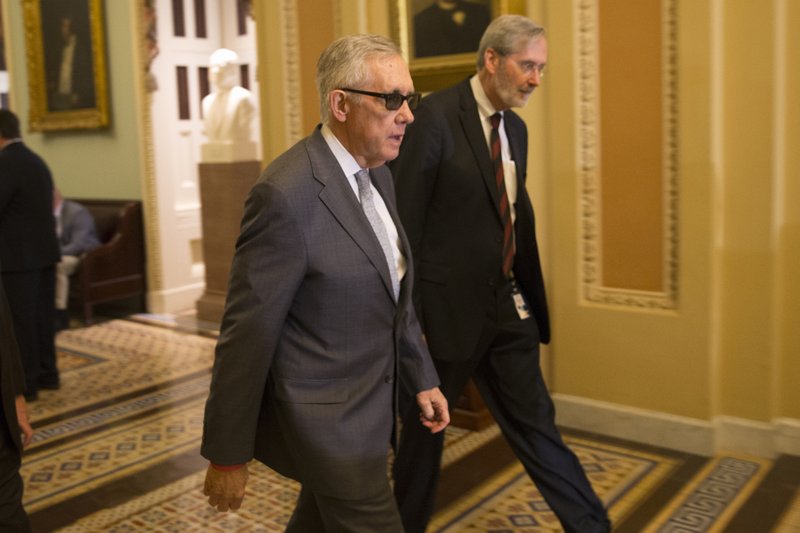WASHINGTON -- The Senate on Tuesday adopted a GOP budget that paves the way for an assault on President Barack Obama's health care law this summer and a showdown over spending bills this fall.
The Senate passed the nonbinding measure by a nearly party-line 51-48 vote. Republican Sens. John Boozman and Tom Cotton of Arkansas voted in favor of the budget plan, which the House adopted last week.
The measure sets a potential path for a balanced budget within a decade. It promises to cut funding for domestic agencies and safety net programs like Medicaid and food stamps, carve up transportation spending and student aid, and curb tax breaks for the poor.
Republicans don't plan to adhere to most of its cuts in follow-up legislation, however.
And in the near term, the GOP plan promises a $38 billion, 7 percent increase for the Pentagon that is possible only by padding war accounts.
Republicans and many economists said balancing the budget helps the economy in the long run and that it's better to tackle the long-term financial problems of programs like Medicare and Medicaid sooner rather than later. They also promise to relieve the burden of debt that's being passed on to future generations.
"That's really unconscionable, to keep spending money and then send the bill to our kids and grandkids and say: 'You pay it. We had a good time. Good luck,'" said Sen. John Cornyn, R-Texas.
The budget plan does not go to Obama. But the president has promised to veto follow-up spending bills that he said will shortchange domestic programs like student aid, highway construction and scientific research.
The measure pleases the GOP faithful by setting up a debate this summer that would permit Republicans to pass legislation to repeal Obama's health care law. That's because Senate Democrats would be unable to filibuster the repeal bill under fast-track budget rules. Obama has said he will veto such legislation.
But Republicans have no plans to follow up the budget document's call for other spending cuts with binding legislation that would, for instance, curb Medicare payments to providers, tighten eligibility rules for food stamps, or move poor and disabled people off the traditional Medicaid program.
Sens. Ted Cruz of Texas and Rand Paul of Kentucky, both presidential contenders, were the only Republicans who voted against the blueprint. GOP Sen. Marco Rubio of Florida, also seeking the White House, voted in its favor, as did Sen. Lindsey Graham of South Carolina, a potential presidential candidate. All Democrats voted in opposition.
Democrats blasted the measure for getting the bulk of its savings from cuts to programs that help the poor and middle class while leaving tax breaks for corporations and the wealthy, including a proposal to eliminate taxes on multimillion-dollar inheritances.
"This is an absolute disaster for the working families of this country," said liberal Independent Bernie Sanders of Vermont, who's running for the Democratic presidential nomination. "In fact, one of the problems that I have had in describing the Republican budget is that it is so bad ... that people don't even really believe you when you talk about what is in this budget."
The budget sets up a battle later this year over the 12 annual spending bills setting agency operating budgets. Republicans have skirted budget rules and are trying to award the Pentagon a 7 percent budget increase while keeping domestic programs frozen at current levels.
Obama and his Democratic allies in the Senate said they will block those budget moves and are calling for a negotiation that would replace immediate and automatic budget cuts known as sequestration with longer-term substitute cuts and revenue from changing some tax provisions. Republican leaders like House Speaker John Boehner of Ohio have said tax increases are out of the question.
Under Washington's budget process, lawmakers first adopt a budget that's essentially a visionary document that sets goals that politicians are often unwilling to pursue.
The measure manages to chart a path toward balance without new taxes, though it assumes Republicans will find about $1 trillion over 10 years to replace taxes from the Patient Protection and Affordable Care Act, like the 3.8 percent surcharge on investment income paid by upper-bracket earners. It also retains large cuts to health care providers under the law, such as Medicare Advantage plans, even though Republicans criticized the cuts in past campaigns.
Senate Republicans prevailed in a debate over a Medicare plan championed by House Republicans that would give people joining the system after 2024 a subsidy to purchase health insurance on the open market rather than a guaranteed package of services.
That plan has failed to resonate in the Senate, particularly among incumbents up for re-election next year in states carried by Obama.
A Section on 05/06/2015
